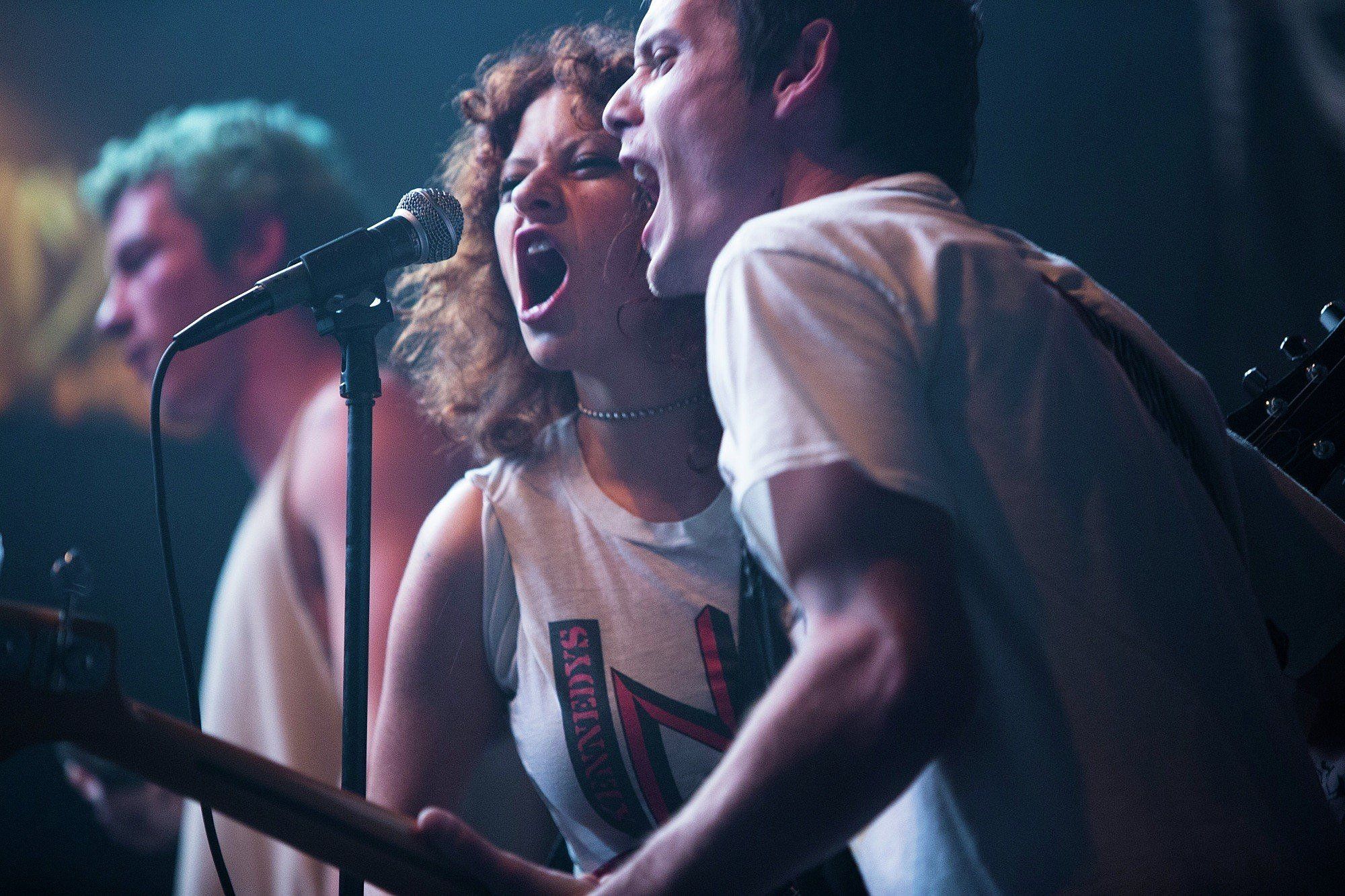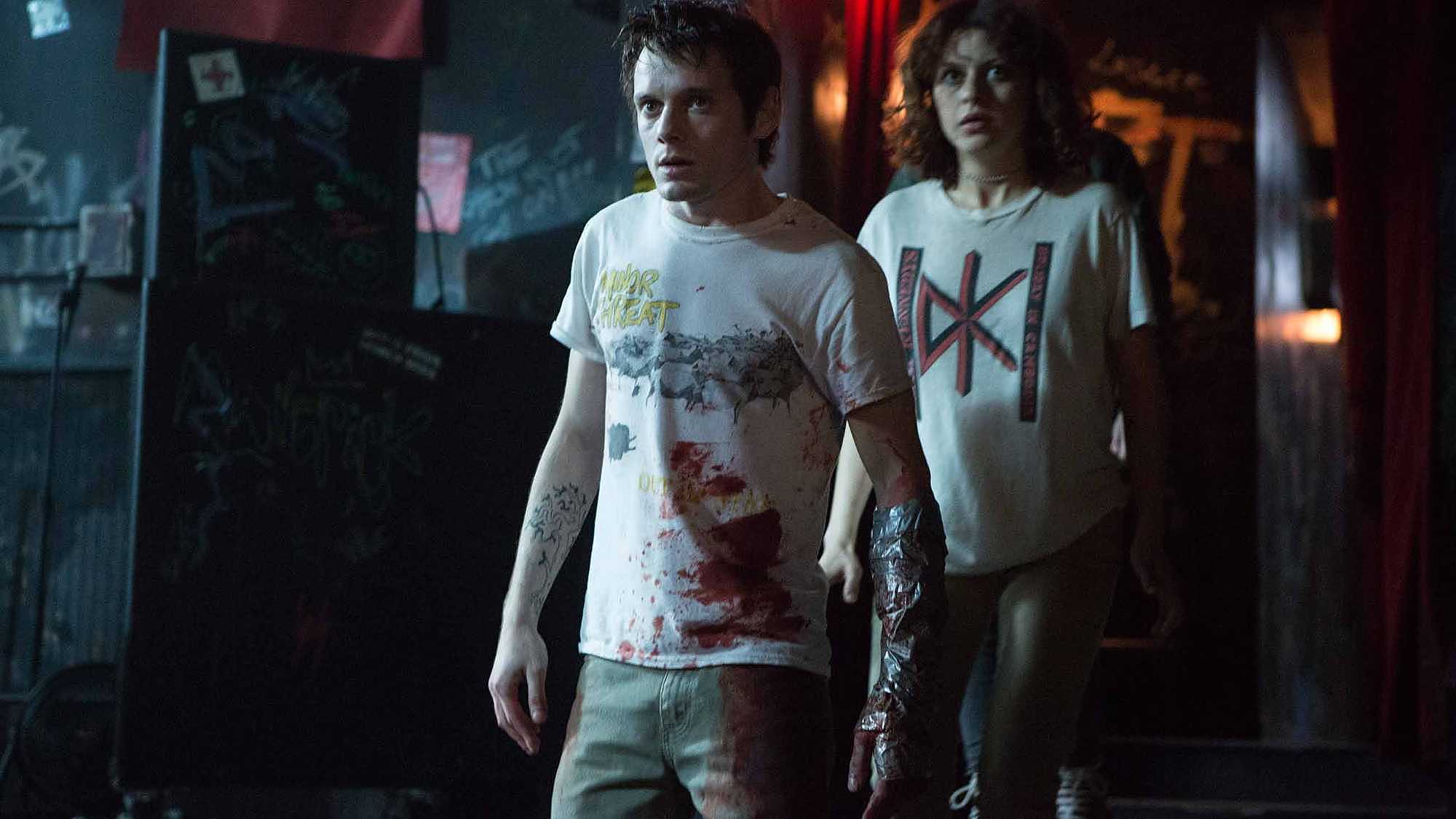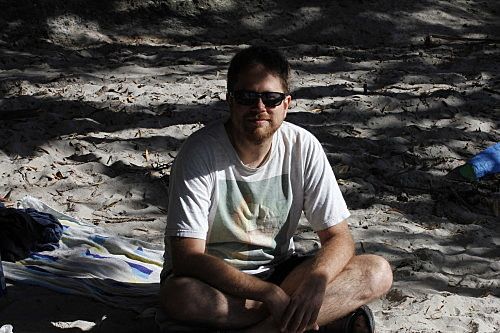Review: Green Room
Bold, bracing and highly accomplished, punk-rock lockdown thriller Green Room cuts close to the bone. For those who can stomach it, Jeremy Saulnier’s film delivers an authentic, unsettling experience.
Bold, bracing and highly accomplished, punk-rock lockdown thriller Green Room cuts close to the bone. For those who can stomach it, Jeremy Saulnier’s film delivers an authentic, unsettling experience.
The notion of a ‘personal’ film is a circumscribed one. Typically, the term conjures a coming-of-age story, a memoir of grief, or a roman-à-clef about a messy divorce. It’s almost never used to described a top-drawer indie thriller characterised by unpredictable punctuations of extreme violence, which is part of what makes Green Room one of the essential films of this year’s Festival.
Director Jeremy Saulnier’s previous film, Blue Ruin, was slept on by many in NZIFF ’13, having come straight from Cannes with little word of mouth and wielding an unpromising, conventional synopsis involving a drifter (Macon Blair) taking revenge for the murder of his parents. From the outset, Saulnier’s eye for composition and thoughtfully-arranged sequences makes it clear we’re in competent hands, but what’s special about the film is the ride it takes the audience on, as expectation shifts from “are we supposed to believe this guy who is incompetent can really execute a revenge properly?” to realising that no, we aren’t supposed to believe that, and that rather than watching a bravura revenge wish-fulfillment fantasy, we’re watching something much more complicated, messy, realistic, and ultimately fulfilling. Anchored by Blair’s powerful performance, Blue Ruin was Saulnier’s calling card, a knock on the door that a director of note has arrived.
Green Room, his follow-up, kicks the door down and breaks it into splinters. The Ain’t Rights, a punk band, are on tour in the Pacific Northwest, and the first fifteen minutes follow them through what appears to be the disintegration of their tour in acutely-observed detail. They crash at a mohawked (but gentle) stranger’s house, their gig falls apart unexpectedly during an interview, they play a Mexican restaurant to two interested listeners. It’s clear that Saulnier knows the milieu of the punk rock lifestyle intimately. He doesn’t, however, lean on the soundtrack so heavily as to alienate those who don’t have time for the music. (In a thrilling early moment, as beers are shared and the party is about to begin, the first few seconds of a Fear record play on a turntable. Suddenly, the film cuts sharply to the end of the record, needle stuck in end groove, everyone passed out from tour exhaustion.)
As the tour disintegrates, the band is offered a well-paying show that at least will get them home to Washington DC (“actually, Arlington”, a band member corrects during an interview, another pitch-perfect detail). The catch? It’s for an audience of skinheads. “Far right … well, technically, extreme left.” And so our heroes enter a rural bar. No one will get out unscarred. Some people won’t get out at all. Fasten your seatbelts.
Whereas Blue Ruin reveled in tonal uncertainty, Green Room knows exactly what it wants to do and how it wants you to feel as it tightens its grip around your neck. Most of the balance of the film is a lockdown thriller akin to Assault on Precinct 13: the band (among others) trapped inside the club’s green room, the skinheads on the outside. Aware of the intrinsic tension of the situation, Saulnier’s script and direction doesn’t rush matters, letting things simmer, explode when least expected, and then relax just long enough to catch a breath before something else steals it away.
Saulnier’s script and direction doesn’t rush matters, letting things simmer, explode when least expected, and then relax just long enough to catch a breath before something else steals it away.
While Saulnier’s an incredibly proficient technician, his cast is his most powerful weapon. Patrick Stewart, as the marquee name and the head of the neo-Nazis, initially seems like a dangerously destabilising star for a realistic film, but his performance avoids bravura. It’s as carefully and thrillingly restrained as Mark Rylance in Bridge of Spies. He’s more like a plumber who’s been brought to a public toilet explosion scene, simply working through the easiest way to clean up the mess. Part of the thrill of Green Room is watching the troubleshooting on both sides of the door: even though the skinheads are never gratuitously humanised, we still get caught up in the intellectual riddle of how this situation could end satisfactorily. Saulnier also wisely acknowledges the abhorrence of the ideology and how it is perpetuated without dwelling on it or relying on ironic speechifying to underline his personal stance.
But Stewart is just one presence in a film with pitch-perfect casting from bow to stern. In addition to Blue Ruin star Blair (who steals his scenes as a doe-eyed recent inductee to the skinhead organisation), most viewers will recognize Ain’t Rights guitarist Alia Shawkat from Arrested Development (unexpectedly plausible in a Dead Kennedys t-shirt), unpredictably dangerous Imogen Poots, and – sadly – bassist Anton Yelchin, whose death was reported the morning of my Green Room screening. Yelchin wasn’t an actor I’d noted much, but he’s the heart of this film. It’s through him, from the very start, that we understand the provisional nature of the complicated family surrogates that punk rock provides, and it’s through him that we feel the pain when things go wrong. His understated, internally-pained performance is a quiet wonder, and it’s terrible to think it’s the last time he’ll have such a canvas.
Some critics, perhaps desperate for a minor caveat with which to criticise the film, complain that Green Room doesn’t carry any thematic heft that transports it beyond the superficial genre thrills it offers. It’s true that Saulnier doesn’t play his cards heavily, preferring realism to cooked moments that emphasise theme. But he also makes clear in its final scenes that Green Room is substantively a film about belonging: what it means to be part of a band, or a scene, or to be a pet – and to lose that thing to which you belonged. Saulnier’s a middle-aged parent now, and his punk rock days are far behind him. This film can easily be read as him trying to say goodbye – and in that context, its final exchange, which I won’t spoil, captures what it means to have moved on in life: to have lost common ground with everyone who knew what mattered to you. We find a new life, we survive, we move on - but we never forget.
Green Room is at the New Zealand International Film Festival


